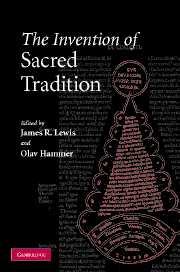Book contents
- Frontmatter
- Contents
- List of figures
- Notes on contributors
- Introduction
- 1 Scientology, scripture, and sacred tradition
- 2 “He may be lying but what he says is true”: the sacred tradition of don Juan as reported by Carlos Castaneda, anthropologist, trickster, guru, allegorist
- 3 The invention of sacred tradition: Mormonism
- 4 Antisemitism, conspiracy culture, Christianity, and Islam: the history and contemporary religious significance of the Protocols of the Learned Elders of Zion
- 5 The invention of a counter-tradition: the case of the North American anti-cult movement
- 6 “Heavenly deception”? Sun Myung Moon and Divine Principle
- 7 “Forgery” in the New Testament
- 8 Three phases of inventing Rosicrucian tradition in the seventeenth century
- 9 A name for all and no one: Zoroaster as a figure of authorization and a screen of ascription
- 10 The peculiar sleep: receiving The Urantia Book
- 11 Ontology of the past and its materialization in Tibetan treasures
- 12 Pseudo-Dionysius: the mediation of sacred traditions
- 13 Spurious attribution in the Hebrew Bible
- 14 Inventing Paganisms: making nature
- Index
- References
2 - “He may be lying but what he says is true”: the sacred tradition of don Juan as reported by Carlos Castaneda, anthropologist, trickster, guru, allegorist
Published online by Cambridge University Press: 22 September 2009
- Frontmatter
- Contents
- List of figures
- Notes on contributors
- Introduction
- 1 Scientology, scripture, and sacred tradition
- 2 “He may be lying but what he says is true”: the sacred tradition of don Juan as reported by Carlos Castaneda, anthropologist, trickster, guru, allegorist
- 3 The invention of sacred tradition: Mormonism
- 4 Antisemitism, conspiracy culture, Christianity, and Islam: the history and contemporary religious significance of the Protocols of the Learned Elders of Zion
- 5 The invention of a counter-tradition: the case of the North American anti-cult movement
- 6 “Heavenly deception”? Sun Myung Moon and Divine Principle
- 7 “Forgery” in the New Testament
- 8 Three phases of inventing Rosicrucian tradition in the seventeenth century
- 9 A name for all and no one: Zoroaster as a figure of authorization and a screen of ascription
- 10 The peculiar sleep: receiving The Urantia Book
- 11 Ontology of the past and its materialization in Tibetan treasures
- 12 Pseudo-Dionysius: the mediation of sacred traditions
- 13 Spurious attribution in the Hebrew Bible
- 14 Inventing Paganisms: making nature
- Index
- References
Summary
Shamanism has intrigued the Western world for over 500 years. When in 1968 an inaccessible and inscrutable student of anthropology called Carlos Castaneda published his book The Teaching of Don Juan, a legion of seekers after truth, social scientists, and scientists in the Western world became fascinated by the worldview of a Yaqui sorcerer who was teaching Carlos to “see” at twilight through the crack in the universe to an alternative reality by ridding him of his blinkered Western logic. Castaneda's books sowed the seed of Western shamanism, often called neo-shamanism, which spread worldwide in the 1970s. Castaneda has been described as “one of the great avatars … of the psychedelic age” and “the principal psychological, spiritual and literary genius of recent generations,” and the Yaqui sorcerer don Juan as “the most important paradigm since Jesus.” The anthropologist Edith Turner sees Castaneda's research as a great liberation, taking us – “like Dante – through a dark passage out the other side into a state of enlightenment.”
The two questions to be answered in this chapter are: (1) How did it come about that a large section of the Western world endowed Carlos Castaneda with such authority that his early books were welcomed as the discovery of an extraordinarily coherent ancient and sacred tradition? (2) When the authenticity of his sources was doubted, why did Castaneda's fame continue, focusing on his imaginative creation and the significance of a new kind of ethnography celebrating the experiential?
- Type
- Chapter
- Information
- The Invention of Sacred Tradition , pp. 38 - 55Publisher: Cambridge University PressPrint publication year: 2007
References
- 2
- Cited by



